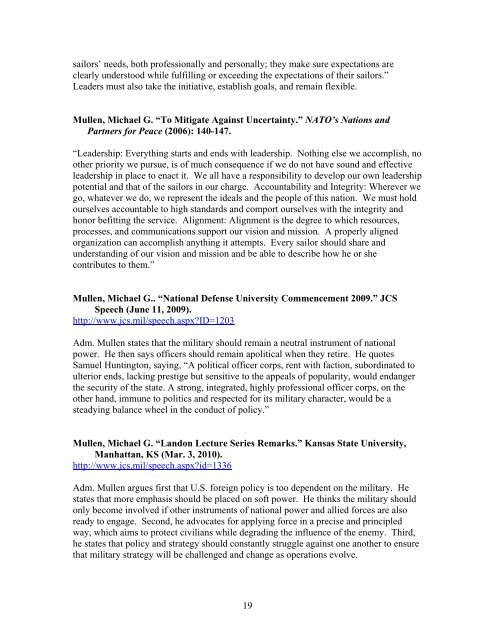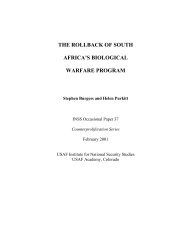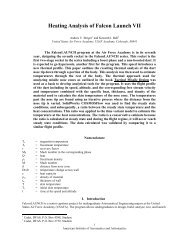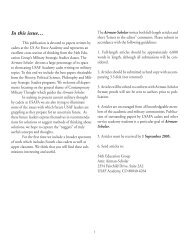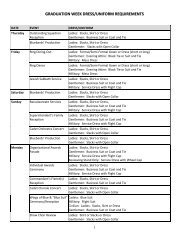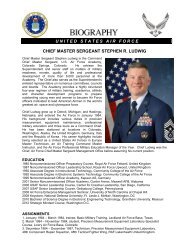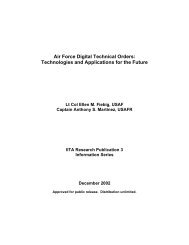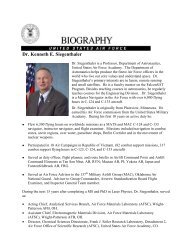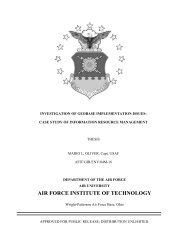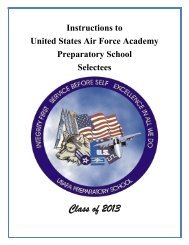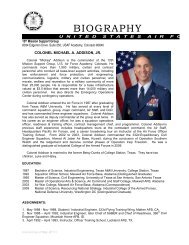Military Professionalism - United States Air Force Academy
Military Professionalism - United States Air Force Academy
Military Professionalism - United States Air Force Academy
You also want an ePaper? Increase the reach of your titles
YUMPU automatically turns print PDFs into web optimized ePapers that Google loves.
sailors’ needs, both professionally and personally; they make sure expectations are<br />
clearly understood while fulfilling or exceeding the expectations of their sailors.”<br />
Leaders must also take the initiative, establish goals, and remain flexible.<br />
Mullen, Michael G. “To Mitigate Against Uncertainty.” NATO’s Nations and<br />
Partners for Peace (2006): 140-147.<br />
“Leadership: Everything starts and ends with leadership. Nothing else we accomplish, no<br />
other priority we pursue, is of much consequence if we do not have sound and effective<br />
leadership in place to enact it. We all have a responsibility to develop our own leadership<br />
potential and that of the sailors in our charge. Accountability and Integrity: Wherever we<br />
go, whatever we do, we represent the ideals and the people of this nation. We must hold<br />
ourselves accountable to high standards and comport ourselves with the integrity and<br />
honor befitting the service. Alignment: Alignment is the degree to which resources,<br />
processes, and communications support our vision and mission. A properly aligned<br />
organization can accomplish anything it attempts. Every sailor should share and<br />
understanding of our vision and mission and be able to describe how he or she<br />
contributes to them.”<br />
Mullen, Michael G.. “National Defense University Commencement 2009.” JCS<br />
Speech (June 11, 2009).<br />
http://www.jcs.mil/speech.aspx?ID=1203<br />
Adm. Mullen states that the military should remain a neutral instrument of national<br />
power. He then says officers should remain apolitical when they retire. He quotes<br />
Samuel Huntington, saying, “A political officer corps, rent with faction, subordinated to<br />
ulterior ends, lacking prestige but sensitive to the appeals of popularity, would endanger<br />
the security of the state. A strong, integrated, highly professional officer corps, on the<br />
other hand, immune to politics and respected for its military character, would be a<br />
steadying balance wheel in the conduct of policy.”<br />
Mullen, Michael G. “Landon Lecture Series Remarks.” Kansas State University,<br />
Manhattan, KS (Mar. 3, 2010).<br />
http://www.jcs.mil/speech.aspx?id=1336<br />
Adm. Mullen argues first that U.S. foreign policy is too dependent on the military. He<br />
states that more emphasis should be placed on soft power. He thinks the military should<br />
only become involved if other instruments of national power and allied forces are also<br />
ready to engage. Second, he advocates for applying force in a precise and principled<br />
way, which aims to protect civilians while degrading the influence of the enemy. Third,<br />
he states that policy and strategy should constantly struggle against one another to ensure<br />
that military strategy will be challenged and change as operations evolve.<br />
19


